 NEWS: Session’s close drawing near with big items waiting for 2020
NEWS: Session’s close drawing near with big items waiting for 2020
BRIEFS: Nominations stall, new cabinet agency, teacher rally, more
COMMENTARY, Brack: State Senate is much-changed in just two decades
SPOTLIGHT: WREN
FEEDBACK: Three letters on wish column – two for, one against
MYSTERY PHOTO: Now, this is some kind of shrubbery
S.C. ENCYCLOPEDIA: Education in S.C., part 1 of 4
THE BIG STORYSession’s close drawing near with big items waiting for 2020
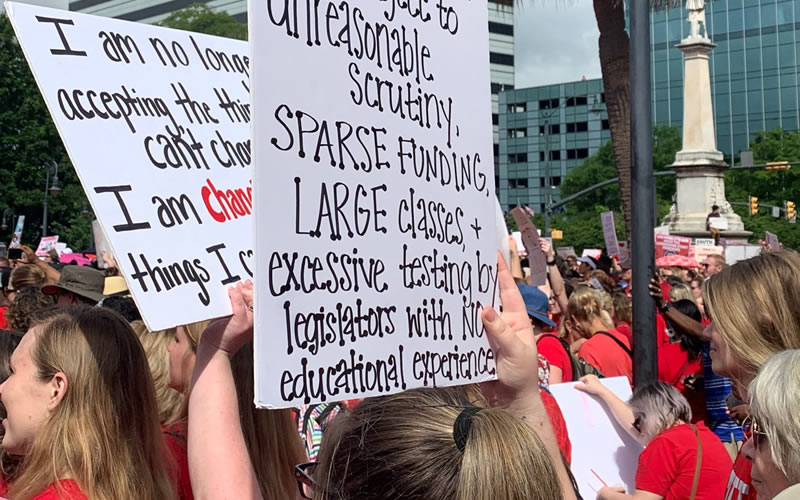
By Lindsay Street, Statehouse correspondent | Lawmakers have three legislative days left to figure out how to deal with $158.6 million in budget differences from a $1 billion surplus.
Since January, lawmakers have passed 42 laws amid the thousands filed. The most talked about effort — education — found itself waylaid until 2020. For now, the biggest thing left is approval of a $9.3 billion budget that includes a whopping $1 billion surplus.
Most differences are nominal in the state’s 2019-20 $9.3 billion spending plan. But there are some significant differences that need to be worked out because of how each chamber wants to spend the surplus:
- The House set aside $11 million but the Senate set aside $9.4 million for increasing the local government fund;
- The House set aside $11 million but the Senate set aside $6 million for increasing judicial salaries;
- The Senate set aside $25 million for farmers flood relief;
- Whether the Department of Commerce receives $85 million (House version) or $50 million (Senate version) for its Rural School District and Economic Development Closing Fund;
- The House set aside $50 million but the Senate set aside $65 million to the Department of Education for school district capital improvements;
- The Senate also set aside $20 million for a one-time bonus for state employees;
- The House would offer $50 checks per taxpayer to the tune of $35 million, but the Senate would offer $50 checks per tax return, which would cost $6 million; and,
- The House set aside $56 million for state-owned building maintenance but the Senate set aside $28 million.
Of the recurring funds, here’s some of what both bodies pledged:
- $159 million for raising the minimum teacher salary and giving 4 percent raises to teacher’s state-based salary;
- $50 million for health insurance premium increases;
- $50 million for maintaining Medicaid;
- $44 million for higher education institutions freezing tuition;
- $41 million for a 2-percent raise for state employees;
- $32 million for pension reform contribution;
- $11 million for the capital reserve fund; and,
- $10 million for S.C. Department of Disabilities and Special Needs to increase its workforce.
Of the one-time funds, here is what both bodies pledged:
- $112 million for higher education capital needs;
- $40 million for new statewide voting system;
- $37 million for state match on VA nursing home;
- $29 million on Department of Social Services Child Support Enforcement System;
- $27 million in general reserve fund;
- $22 million in state match for FEMA Hurricane Florence recovery; and,
- $10 million in prison safety upgrades.
The Senate’s to-do list
Over the past week, the Senate was embroiled in a second week of floor discussions on how to proceed with evaluating sales for state-owned utility Santee Cooper. On Thursday, senator gave second reading on H. 4287, which charges the Public Service Authority Evaluation and Recommendation Committee to evaluate bids for the utility. Under the Senate version, the state Department of Administration will evaluate bids. They are expected to take up a third reading Friday. The House and Senate will likely come to a compromise next week.
The question of Santee Cooper backed up the Senate’s 47-page calendar, which will now be addressed starting Tuesday. Big-ticket items still on the Senate’s calendar include:
- Solar promotion and industry protections (H. 3659): This major bill would lift a cap on solar energy generation reimbursement for rooftop solar customers. It also would , and mandate contract lengths between utilities and independent solar generators.
- Local government fund revisions (H. 3137): The legislation would discontinue the former approach for funding political subdivisions that is tied to the previous year’s revenues and would tie local government funding to state revenue forecasts. The funding requirement for the Local Government Fund, set at 4.5 percent of the previous year’s state general fund revenues, would be replaced with new funding requirements structured to deliver a revenue stream to counties and municipalities that is adjusted according to whether the state is projected to experience revenue growth.
- Banning female genital mutilation (H. 3973): The bill would make it a felony to mutilate the genitalia of females who are under the age of 18 or older females who are unable to consent to the procedure. The bill passed the House March 6.
To do-list for the House
The House has a significantly shorter calendar left after Thursday’s session. Here are two big issues coming up next week:
- Expanding physician assistant practice (S. 132): The bill, among many things, revises the Act to include several provisions that include expanding the responsibilities and duties of physician assistants. It passed the Senate March 21. It is now on the calendar; and,
- Ban on underage marriage (S. 196): This bill would repeal existing state law that permits an unmarried female and male under the age of 18 to get a marriage license when the female is pregnant or has borne a child. The Senate passed it Jan. 30. It is now on the calendar.
- PAST COVERAGE: Want to see more bills that have passed one body, but not the other? Here’s one we compiled a few weeks ago.
Accomplished: What has been done (so far)
 So what about the 42 laws that have actually been ratified this year? Here are some of the bigger ones:
So what about the 42 laws that have actually been ratified this year? Here are some of the bigger ones:
- Waived school days for lost days due to Hurricane Florence (H. 3929);
- Transparency for violations by student organizations at higher education institutions codified without a sunset (H. 3398);
- Extension of deadline for obtaining new voting machines and creation of an evaluation panel (H. 4157);
- Panel created for finding three finalists for a gubernatorial nomination for director of the S.C. Department of Employment and Workforce (S. 540); and,
- The hemp industry has been legalized in the state (H. 3449).
What’s left to do
The question of what to do with the sprawling, state-owned utility Santee Cooper, and how to direct and evaluate its sale will continue to loom large in the off-session. The Senate has largely pushed for a state agency to evaluate bids with leaving lawmakers the ability to vote on a winning bid. The House has pushed for a legislative panel to evaluate bids that would then be brought before lawmakers for a vote. The differences may head to conference for a fix before the session ends.
Further complicating the issue, a Senate committee voted down Gov. Henry McMaster’s nominee to chair the board of the agency, Charlie Condon, leaving the agency without a permanent leader until they reconvene to confirm another nominee.
In January, the session will pick up where it leaves off. That means items in committee remain in committee, and items on the calendar remain on the calendar.
Taxes, education and pension reform are expected to be big topics in 2020.
- Tax reform is already swirling (see our previous coverage here), and part of that will factor into further education reform, tied to property taxes. On the day the legislature adjourns — May 9 — the state Revenue and Fiscal Affairs Office is expected to release a report about education funding in the state.
- While teachers will get more pay in the new budget, the push on systemic education reform faltered this year after 15 subcommittee meetings in the Senate. The huge teacher rally on Wednesday underscored lawmakers’ inaction on items such as reducing class size and mandating duty-free breaks for teachers. Lawmakers will work on this issue over the break and into the beginning of the session.
- While pension reform was identified as a must-do by some lawmakers at the start of session, it never grew legs this session. A second phase of pension reform will likely be addressed in 2020.
One contentious item the Senate also will deal with next year is the proposed fetal heartbeat abortion ban. It passed the House last month.
Readers who weighed in on a December survey said infrastructure and climate change should be an important priority among lawmakers this session. Three bills that deal with water passed one body and are now awaiting votes in the other body:
- Water resource statewide plan (H. 4011): The bill adds a “State Water Plan” as an example of a comprehensive water resource policy in which a state agency provides assistance to the governor and General Assembly in formulating. It passed the House April 5. It is now in the Senate Agriculture and Natural Resources Committee.
- Allowance for local taxes to be used for flooding mitigation (S. 217): This bill revises provisions relating to the expenditure of the state accommodations tax, local hospitality tax and local accommodations tax. It also would allow the revenue to be expended for the control and repair of flooding and drainage at tourism-related lands or areas and for site preparation, including demolition, repair, or construction. The Senate passed the bill Jan. 23. It is now in the House Ways and Means Committee
- South Carolina Resilience Revolving Fund (S. 259): The proposed legislation would create a fund to provide low interest loans to perform flooded-home buyouts and floodplain restoration. The Senate passed it March 20. It is now in the House Ways and Means Committee.
No movement
Before session began, Statehouse Report surveyed readers on what they felt should be a priority for lawmakers. Education topped the list, but not far behind were gun reform, redistricting, campaign finance reform and expanding health care. Read the story here.
While there were bills filed on each of those topics, none advanced beyond committee.
But while no major health care bill was debated on the floor this year, the budget included a $23 million increase in the Children’s Health Insurance Plan spending to cover 20,000 more children who are not covered by Medicaid. Read more.
- Have a comment? Send to: feedback@statehousereport.com
NEWS BRIEFS
Nominations stall, new cabinet agency, teacher rally, more
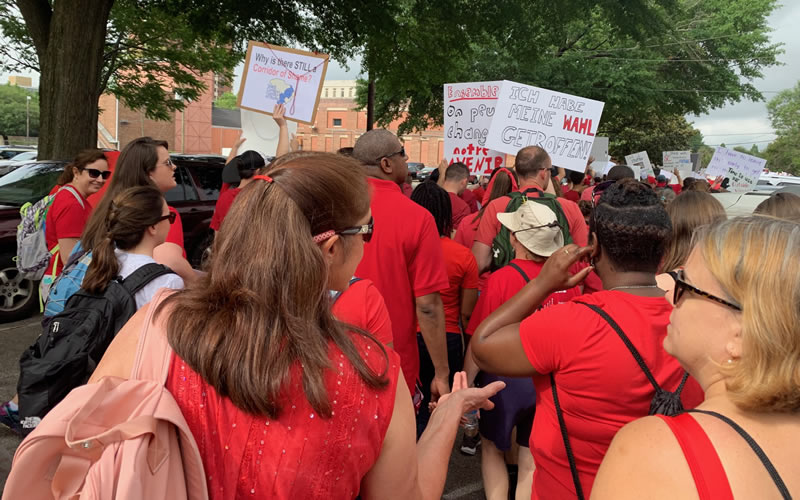
By Lindsay Street, Statehouse correspondent | Senators bucked Gov. Henry McMaster this week by rejecting two state agency nominations, while a key nomination remains unnamed.
The full Senate rejected the nomination of Steven Morris for the Department of Aging and a Senate committee rejected the nomination of former S.C. Attorney General Charlie Condon for Santee Cooper. So unless something changes quickly, the head of the department and board chair of Santee Cooper may not have a Senate-confirmed leader until next year.
In the meantime, the Governor’s Office has yet to release the name of its nominee to become the state’s first Child Advocate. On March 5, McMaster received three names from the legislative panel charged with evaluating candidates. Those candidates included: Mary Williams, who has worked with S.C. Department of Social Services (DSS) and with federal child welfare; Amanda Whittle, who is legal staff with S.C. DSS; and Candace Lively, who is an assistant solicitor in Horry County.
The state Child Advocate will lead a small agency designed to consolidate and oversee child services in the state.
According to McMaster spokesman Brian Symmes, the nominee would be announced this week, but Symmes had a personal health issue that waylaid the announcement. He said in a conversation Friday morning that the announcement could be made as early as this evening, however.
The position is slated to begin July 1. If a nominee is not made and confirmed prior to the end of session, one of the three finalists will be chosen as an acting head of the oversight agency until Senate confirmation next year, according to S.C. Sen. Katrina Shealy, R-Lexington, who was on the panel selecting the finalists.
In other news:
Veterans affairs office made a cabinet agency. House Bill 3438 was signed into law recently and it puts the S.C. Veterans Affairs Office under the governor’s office. The agency was previously a division under the Office of Executive Policy and Programs.
Weekly update on Palmetto Priorities
 Throughout the legislative session, we have been providing relevant updates related to our list of Palmetto Priorities, which are 10 big policy areas where major progress is needed for South Carolina to escape the bottom of lots of lists. Over the last week:
Throughout the legislative session, we have been providing relevant updates related to our list of Palmetto Priorities, which are 10 big policy areas where major progress is needed for South Carolina to escape the bottom of lots of lists. Over the last week:
EDUCATION: Largest protest in years descends on Statehouse. Comparisons were inevitable with a 10,000-strong education rally in Columbia on Wednesday. Some compared it to the 2000 anti-Confederate flag protest (although that one was reported to number 45,000), while others compared it to another anti-Confederate flag moment in 2015 (a bit closer in scale; that one was reported to number 10,000). Regardless, this week’s event appeared to be the largest education-focused rally on the Statehouse. The moment was hard to ignore, though the legislative session went on inside the Statehouse as usual. According to an analysis of social media mentions of #AllOutMay1, the hashtag associated with the rally, more than two-thirds of mentions were in support of those that turned out.
GUN REFORM: Action event announced for May 9. Arm-in-Arm is holding an event titled “Ideas into Action: Children, Guns and Safety” May 9 in Mount Pleasant. The event will feature a panel discussing the impact of gun violence on children and communities in the state. Click here for more information.
UTILITIES: Solar stymied by statehouses. The Center for Public Integrity released a report this week that shows state policies encourage or discourage renewable energy and directly relate to how much solar power is produced. Read the report here.
Looking ahead
Click below for other items coming up in the Statehouse:
Find any bill
- Senate bills
- Have a comment? Send to: feedback@statehousereport.com
BRACK: State Senate is much-changed in just two decades
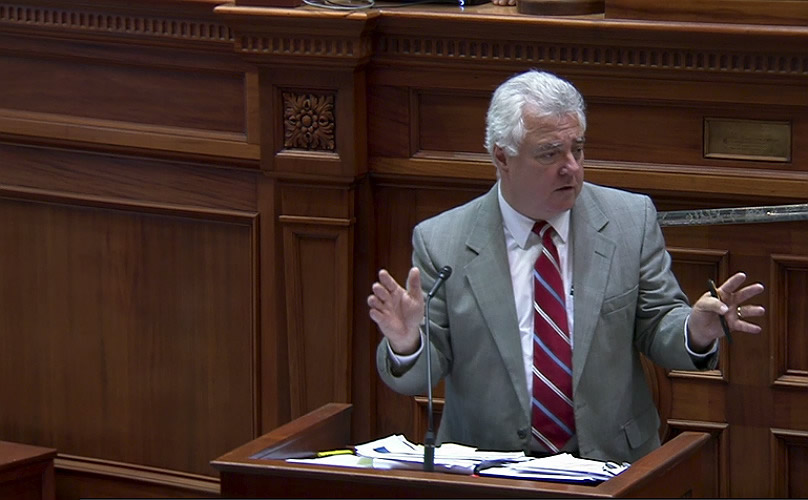
By Andy Brack, editor and publisher | Anyone who doesn’t believe government doesn’t change needs to look to the South Carolina Senate. Compared to what it was 20 years ago, it’s almost a hot mess today.
 Two of the differences are easy to see. First, some once familiar names that dominated headlines – Drummond, Fair, Courson, Ford, McConnell, Hayes, Leventis, Martin, McGill, Ravenel, Washington, Wilson, Thomas – are no longer there. Of the states 46 senators, only 11 serving today were in the chamber 20 years ago.
Two of the differences are easy to see. First, some once familiar names that dominated headlines – Drummond, Fair, Courson, Ford, McConnell, Hayes, Leventis, Martin, McGill, Ravenel, Washington, Wilson, Thomas – are no longer there. Of the states 46 senators, only 11 serving today were in the chamber 20 years ago.
Second, Democrats no longer rule the Senate roost. In the 1994 elections, Republicans gained control of the S.C. House for the first time in generations. Six years later despite having a Democratic governor, the state shifted more toward Republicanism as the state’s 46 senate seats split evenly between the two parties.
But just before the start of the 2001 session, longtime Democratic Sen. J. Verne Smith of Greenville shocked leaders by switching parties – and putting the state Senate in the Republican column.
That switch led to bigger changes that continue to impact the state Senate today.
When Republicans got control, they did two things quickly to upend the apple cart of Senate tradition which ultimately led to a more partisan, slightly less congenial body.
First, the GOP changed the seniority system of committee control. Prior to 2001, senior senators, no matter the party, ran Senate committees. But under GOP control, an extra component was added – political party. Under the new rule, powerful committee chairmanships were to be controlled by seniority, but by members of the majority party. In essence, the new minority Democrats, many of whom had years of seniority, no longer had control, often becoming ranking members to chairmen who were years younger.
What this change ultimately meant was political parties became much more important in the Senate. That meant more friction and less congeniality compared to two decades ago. It’s not as if these folks are overtly rude today, compared to years past, but there’s an edge of tension simmering just below the surface compared to the clubbiness of the past.
The second impactful rule change saw the new GOP majority increase the number of senators on the two major committees, Judiciary and Finance, from 18 to 23. That meant every senator was on one of the body’s two major committees. So a freshman, who in the past would have to wait a few years to move up the chain of seniority to get a seat on a major committee (and have more influence), automatically became part of a big committee.
This, too, increased partisanship as new, young Senate firebrands, often elected on platforms that were more left or more right of the general population, would speak out – and get media coverage – on big issues. No longer were freshmen relegated to the back benches.
Through the years, there have been other changes. This year, for example, the state’s lieutenant governor no longer is presiding officer of the Senate. For the first time, the person who controls the daily session is its new president. This shift has changed the day-to-day dynamic and, in some ways, has insulated the Senate from outside interference from external politics. (Remember, the state went through three lieutenant governors in a short spell after one got caught up in scandal, a successor left to lead a college and another took over briefly before a new election.)
Other changes limit debate and make it harder for one senator to gum up the legislative works. It can be argued this moves along needed legislation quicker, but the Senate is supposed to be the state’s deliberative body, not a rollercoaster for new laws.
Our state’s new Senate, because it is more partisan, also is less of a place where elected elites spend lives. In the hyper-partisan outside world, seemingly promising long Senate careers are shortened at the polls by frustrated voters, which leads to more Senate turnover, which isn’t necessarily a bad thing. It used to take a young senator a decade to get enough seniority to make a bigger difference. Now, someone elected a few years back is in the middle of the pack of seniority.
You might like new changes. You might not. But democracy constantly evolves, even in the S.C. Senate.
- Andy Brack’s new book, We Can Do Better, South Carolina, is available via Kindle.
- Have a comment? Send to: feedback@statehousereport.com.
SPOTLIGHT: WREN
 The public spiritedness of our underwriters allows you to read Statehouse Report at no cost. This week, we shine our spotlight on the Women’s Rights and Empowerment Network (WREN), a South Carolina-based nonpartisan network created to build a movement to advance the health, economic well-being, and rights of South Carolina’s women, girls, and their families. WREN provides a strong, collective voice for South Carolina’s women and girls.
The public spiritedness of our underwriters allows you to read Statehouse Report at no cost. This week, we shine our spotlight on the Women’s Rights and Empowerment Network (WREN), a South Carolina-based nonpartisan network created to build a movement to advance the health, economic well-being, and rights of South Carolina’s women, girls, and their families. WREN provides a strong, collective voice for South Carolina’s women and girls.
With its partners and members:
WREN advocates at the Statehouse for policies and laws that will improve the status of women.
WREN educates the public on issues that affect women and girls and seeks to inspire action.
WREN empowers people and strengthens organizations to support women and young people.
WREN builds coalitions of people and organizations committed to improving opportunities in South Carolina.
WREN convenes diverse voices, collects and disseminates research, and shares information about practical solutions to promote gender equality and improve our state’s health and economic vitality.
- To learn more, visit WREN online at: http://www.scwren.org
FEEDBACK
Wish list column gets three responses – two pro, one anti
To the editor:
![]() I really enjoy your thought-provoking articles. The April 30 one on “While I Breathe, I Wish and Hope” was amazing to me in that your wishes and hopes align with mine. As a lifelong Cubs fan, I’m with you on abolishing the Designated Hitter.
I really enjoy your thought-provoking articles. The April 30 one on “While I Breathe, I Wish and Hope” was amazing to me in that your wishes and hopes align with mine. As a lifelong Cubs fan, I’m with you on abolishing the Designated Hitter.
Keep up the good stuff, and continue to be an enlightened Trump critic.
— Milt Marley, Ridgeway, S.C.
To the editor:
I liked your post “While I breathe, I wish and hope.” I want to add a wish and hope that this wish will ascend to a higher power that can make it come true.
Here is the wish: I wish that we could change the word “socialism” to “social investment” because the former has too much negative baggage and triggers a knee-jerk rejection in many voters. Call it what it is now. It is social investment.
Thanks for any push you can give this wish.
— Hannah Poe, Greenwood, S.C.
To the editor:
Your wishes, with a twist (I’ve skipped the ones I largely agree with)
I wish the people who accuse the president of not respecting and honoring the Constitution would step back a look at the mess we’ve made of the country since, oh let’s say, the Vietnam War. The Constitution was kicked to the curb long ago.
I wish people would grasp the sanctity of life and recognize that avoiding an unwanted pregnancy beats aborting one.
I wish people who want more of my tax money would explain to me why I should be kicking in more while many pay nothing and the federal government continues to operate without a budget while spending us into oblivion. Debt is our biggest crisis.
I wish the “dreamers” who want to live here would come within the confines of the law.
I wish that all Americans who are eligible to vote would stop spending so much time on social media and watching reality TV, pay attention to the issues, learn the astoundingly great history of our great country, and then go out and vote.
I kinda wish that everyone who thinks humans are ruining the earth should themselves leave the USA, go to China, India etc., and convince them to clean up their acts. The climate has been changing forever, and it will continue to change.
I wish (no, hope) that Donald Trump wins big, best election ever!
I wish differences of opinion are allowed to continue, and the freedom of speech does not succumb to the progressive Antifa types who want to shout down those who they disagree with and speak out in opposition of their self-serving, contrived facts.
— Phil Tackett, Summerville, S.C.
Remembering Fritz Hollings
To the editor,
Enjoyed your piece about the late Senator.
Yes, the ox is in the ditch. Reminds me of a time when Republicans and Democrats could work through things for the good of the country.
— Joe Reynolds, North Charleston, S.C.
Send us your thoughts … or rants
We love hearing from our readers and encourage you to share your opinions. But you’ve got to provide us with contact information so we can verify your letters. Letters to the editor are published weekly. We reserve the right to edit for length and clarity. Comments are limited to 250 words or less. Please include your name and contact information.
- Send your letters or comments to: feedback@statehousereport.com
Now, this is some kind of shrubbery

The fellows at Monty Python likely would go nuts about this shrubbery, as did a contributing photographer who sent it along. It’s in South Carolina, but where? Send your guess about the location of this photo to feedback@statehousereport.com. And don’t forget to include your name and the town in which you live.
Our previous Mystery Photo
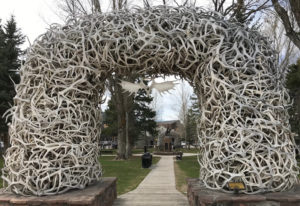 The subject of our April 26 mystery, “A different kind of archway” drew lots of responses, meaning either a lot of people have visited Jackson, Wyoming, or they are really good with computer work to figure out mystery photos. The photo showed an antler arch in George Washington Memorial Park in Jackson.
The subject of our April 26 mystery, “A different kind of archway” drew lots of responses, meaning either a lot of people have visited Jackson, Wyoming, or they are really good with computer work to figure out mystery photos. The photo showed an antler arch in George Washington Memorial Park in Jackson.
More people (19) correctly guessed this week’s mystery than ever before. Just look at the list and see how these enlightened sleuths hail from all over the state … and beyond. Congratulations to: Dale Rhodes of Richmond, Va.; George Graf of Palmyra, Va.; Shayna Howell of Folly Beach; Dorothy Munchmeyer of Lexington; Henry Eldridge of Tega Cay; Gwen Strickland of Marion; Philip Cromer of Beaufort; Elaine Huff-Lowe of Inman; Ashley Aldebol of Greenville; Jay Altman, Aaron Scheuer and Val Valenta, all of Columbia; Bob Stillwagon of Boiling Springs; Barry Wingard of Florence; Mary Miles of Spartanburg; Charles E. Davis of Aiken; Bobby Ridgeway of Manning; Judy Hines of Charleston; and Don Clark of Hartsville.
Graf sent this context: “According to yellowstonepark.com, it’s a toss-up whether the Tetons or the elk antler arches at the four corner of Jackson’s Town Square are more photographed by visitors, writes local Jackson writer Dina Mishev in the book On the Road Yellowstone. When the local Rotary Club erected the first arch in 1953, it had no idea it was creating an icon. But the arch was an instant hit with visitors, so the club started planning for additional arches, one on each corner. These were built between 1966 and 1969. (The southwest corner was the first to get its arch.) Today’s arches are not the original ones, though. Elk antlers have a life span.”
Send us a mystery: If you have a photo that you believe will stump readers, send it along (but make sure to tell us what it is because it may stump us too!) Send to: feedback@statehousereport.com and mark it as a photo submission. Thanks.
S.C. ENCYCLOPEDIA
HISTORY: Education in South Carolina
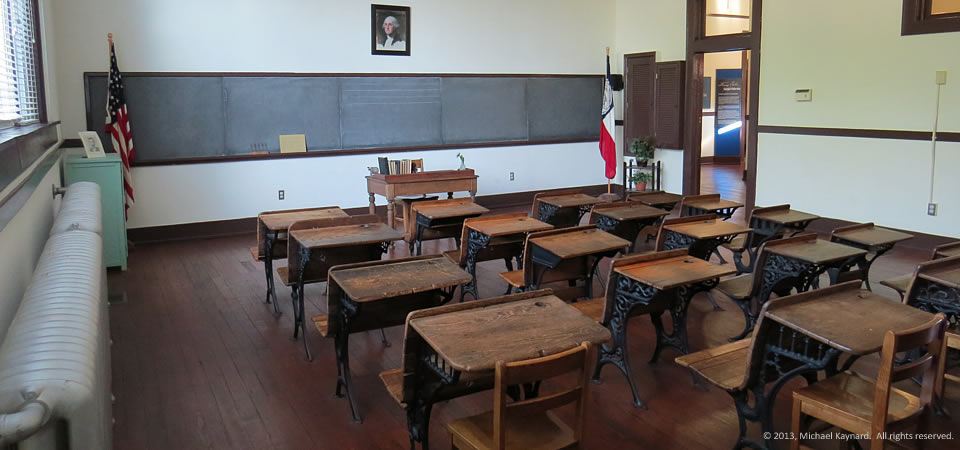
S.C. Encyclopedia, part 1 of 4 | For much of the state’s history, education was left principally to families. Nonetheless, while historically the state’s support of schooling has been hesitant, sporadic, and limited, the last two decades of the twentieth century witnessed growing attention to schools. By the end of the twentieth century, reform of South Carolina public schools had entered the forefront of political debate.
Reflecting the English roots of colonial South Carolina society, early education was centered in the home and church. For formal education wealthy, white families might hire tutors or send their children to private schools in Charleston. Education for crafts was provided through apprenticeships.
The first expressions of public support for “free schools” came in the early eighteenth century. Some individuals had bequeathed money for the purpose of supporting free schools. In 1712 “An Act for Founding and Erecting of a Free School in Charlestown” was passed, actually recognizing a school already established in Charleston under John Douglas, but also providing limited public funds for the support of free schools established in other parishes as well. Masters had to be Anglicans, and instruction was required “in Grammar, and other arts and sciences and useful learning, and also in the principles of the Christian religion.”
Free schools were operated for the children of poor whites who could not afford a private school or tutor. Organizations establishing such schools included the South Carolina Society, the Winyaw Indigo Society, the Mt. Zion Society, and the Anglican Society for the Propagation of the Gospel in Foreign Parts. The most long-lived of such schools was a manual training school established in the Abbeville District through a 1797 bequest by John de la Howe.
Educational opportunities for black South Carolinians were extremely limited. While the wives of masters might instruct favorite slaves in Christianity and the reading of the Bible—and occasionally black students received instruction in free schools, most notably at the school of the Reverend Alexander Garden in Charleston—most whites were skeptical of the value of educating blacks. Beginning in 1740 and continuing throughout the colonial and antebellum periods, the South Carolina legislature passed statutes limiting the teaching of writing and reading to slaves and free blacks. Despite these laws, schools for free blacks supported by religious and fraternal organizations survived in Charleston during the antebellum period.
Throughout the colonial period and beyond, private education remained the norm. Tuition-charging academies were the mainstay of secondary education. Notable schools included the Mt. Bethel Academy in Newberry, Moses Waddel’s Willington Academy in Abbeville District, and Madame Ann Mason Talvande’s French School for Young Ladies in Charleston. Other private academies sprang up throughout the state, sometimes with limited state support. The curricula of these schools tended to the classics, Greek, Latin, and mathematics but varied according to the gender of the students. One female academy in Columbia, for example, offered a course of study that included belles lettres, French, music, drawing, and plain and ornamental needlework. There were 117 academies in the state by 1840 and more than 200 in 1860. An 1850 act provided support for the establishment of military schools in Anderson, Marion, and Spartanburg.
In 1811 the General Assembly passed a new free school act authorizing the establishment of schools in each district equal to its number of representatives in the legislature. The state subsidized these schools at a meager level, and any white child could attend free, with priority given to orphans or children of the poor. These free schools came to be seen as “pauper schools,” a stigma that kept many away. Typically the quality of both the buildings and the instruction was low. In 1860 there were only 1,395 teachers operating 1,270 schools for 18,915 students.
The “common school” movement that swept the North and Midwest during the 1840s and 1850s missed South Carolina. State leaders debated the need for education for the laboring classes, and most seemed to feel that it would make them dissatisfied with their lot. Most estimates suggest that by 1860 only half of the state’s white children received any schooling. Charleston was the exception. There, city fathers combined state allocations with a local tax to support schools attractive to all social classes, thus removing the “pauper school” stigma. The scheme included a city high school for girls to which was appended a normal, or teacher-training, school.
— Excerpted from an entry by Deborah M. Switzer and Robert P. Green Jr. This entry may not have been updated since 2006. To read more about this or 2,000 other entries about South Carolina, check out The South Carolina Encyclopedia, published in 2006 by USC Press. (Information used by permission.)
Columnists book highlights how S.C. can do better
 We Can Do Better, South Carolina! offers incisive commentaries by editor and publisher Andy Brack on the American South, the common good and interesting South Carolina leaders, such as former U.S. Sen. Fritz Hollings, civil rights advocate Septima Clark, former S.C. Gov. David Beasley and more. There also are discussions on civil rights struggles with which the Palmetto State continues to grapple. as well as commentaries on politics, governments, the hangovers of South Carolina’s past and her future opportunities.
We Can Do Better, South Carolina! offers incisive commentaries by editor and publisher Andy Brack on the American South, the common good and interesting South Carolina leaders, such as former U.S. Sen. Fritz Hollings, civil rights advocate Septima Clark, former S.C. Gov. David Beasley and more. There also are discussions on civil rights struggles with which the Palmetto State continues to grapple. as well as commentaries on politics, governments, the hangovers of South Carolina’s past and her future opportunities.
We Can Do Better, South Carolina! is available exclusively as a Kindle book for $7.99. Click here to purchase a Kindle copy. A paperback version will be ready for order soon.
- If you have a comment or questions about the book, please let us know at: feedback@statehousereport.com.
ABOUT STATEHOUSE REPORT
Statehouse Report, founded in 2001 as a weekly legislative forecast that informs readers about what is going to happen in South Carolina politics and policy, is provided to you at no charge every Friday.
- Editor and publisher: Andy Brack, 843.670.3996
- Statehouse correspondent: Lindsay Street
More
- Mailing address: Send inquiries by mail to: P.O. Box 22261, Charleston, SC 29407
- Subscriptions are free: Click to subscribe.
- We hope you’ll keep receiving the great news and information from Statehouse Report, but if you need to unsubscribe, go to the bottom of the weekly email issue and follow the instructions.
- © 2019, Statehouse Report. All rights reserved.















